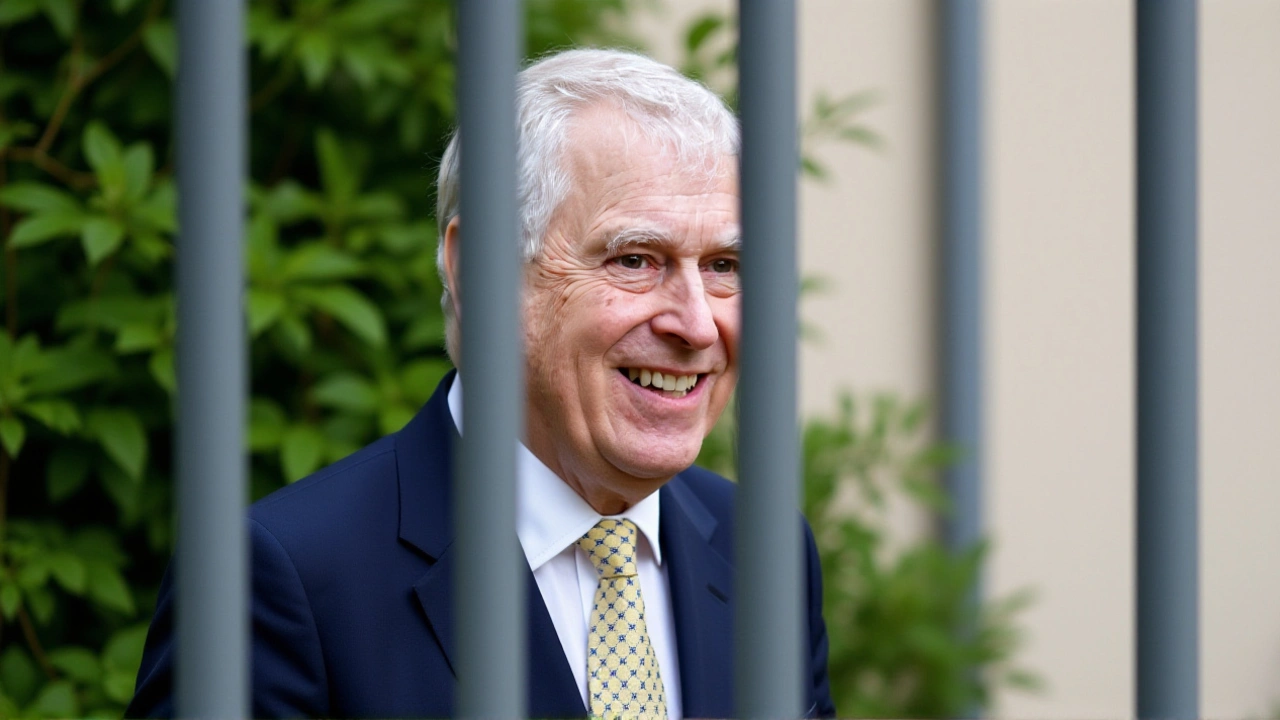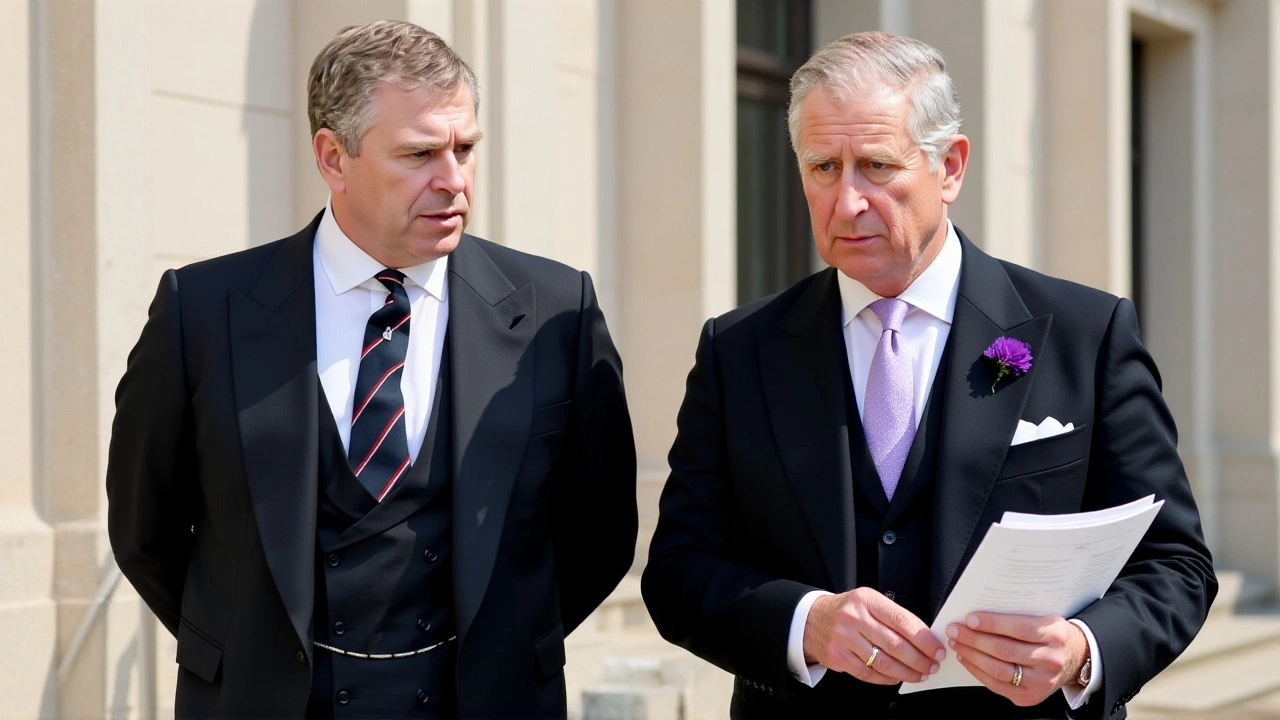When Prince Andrew, the 65-year-old Duke of York, quietly surrendered his remaining royal titles in early 2025, it wasn’t just a formality—it was a royal eviction. The announcement, issued by the British royal household without fanfare, erased the last official traces of his public role. He no longer holds the title Duke of York, nor any military affiliations or royal patronages. The move, confirmed by palace insiders to RadarOnline.com, came after years of pressure from King Charles III, 76, and his son, Prince William. And the real story? It wasn’t Prince Andrew’s choice. Not really.
The Hidden Message in ‘We’
The official statement used one word that told everyone everything: we. "The pronoun ‘we’ is incredibly telling," said Jennie Bond, a veteran royal commentator. "It’s not ‘I have decided.’ It’s ‘we have decided.’ That’s the royal family saying, ‘This isn’t up for negotiation.’" That single pronoun, buried in a dry press release, carried the weight of a family council. Royal aides, speaking anonymously, described the discussions leading to the decision as "tense and emotional." Prince William, who’s been quietly reshaping the monarchy’s future, reportedly made it clear to his uncle: there would be no return to public duties under his reign. Not ever.Why Now? The Long Road from 2019
Prince Andrew stepped back from royal duties in 2019, following his disastrous BBC interview about his association with Jeffrey Epstein. Since then, he’s lived in near-seclusion at Royal Lodge, a 30-room mansion tucked inside Windsor Great Park in Berkshire, United Kingdom. It’s Crown Estate property—technically not his, but lent to him. Now, even that privilege is stripped of its royal context. King Charles III, according to courtiers, was "deeply pained" but resolute. "The monarchy simply can’t keep being dragged into distractions like this," one aide said. The decision wasn’t about punishment—it was about survival. The institution had weathered scandals before, but Andrew’s presence, even in silence, kept the wounds open. Every news cycle, every court filing, every tabloid headline reminded the public of a chapter the royal family wanted buried.Prince William’s Quiet Coup
While Charles carried the weight of the decision, William was the architect. He didn’t make public statements. Didn’t hold press conferences. He worked behind the scenes, speaking with senior aides, reviewing legal documents, and ensuring the next generation wouldn’t inherit the same burden. "William’s been working quietly in the background, but his influence has been strong," said one insider. "He feels it’s his duty to safeguard the monarchy’s future, even if that means making difficult decisions about his own family." That’s not just loyalty—it’s legacy management. William, as heir apparent, understands that public trust is fragile. He’s spent years cultivating a modern, accessible image. Andrew’s lingering title? A walking contradiction.What This Means for the Monarchy
The removal of Prince Andrew’s titles isn’t symbolic—it’s structural. It clears the deck for the next phase: a monarchy defined by Charles’s vision and William’s execution. No more awkward photo ops. No more media circus when he’s spotted at the races. No more questions about whether he’ll ever "return to duty." Experts agree: this was inevitable. The monarchy’s approval ratings have been climbing since Queen Elizabeth II’s death, especially among younger Britons. But Andrew’s shadow kept dragging it down. Now, with his titles gone, the institution can finally move forward without the anchor.
What’s Next for Prince Andrew?
He’ll stay at Royal Lodge. He’ll continue to live privately. He won’t attend royal events. He won’t represent the Crown. He won’t even be invited. His children, Princesses Beatrice and Eugenie, remain in the line of succession—but their father is now just a private citizen, with no official role, no title, no platform. The British royal household has made no statement about whether he’ll retain his style of "His Royal Highness." But sources suggest even that may be quietly phased out over time.Historical Precedent
This isn’t the first time a royal has been sidelined. In 1936, King Edward VIII abdicated to marry Wallis Simpson. But he kept his title—Duke of Windsor. Andrew didn’t abdicate. He was removed. That’s the difference. Edward chose his path. Andrew’s was chosen for him. The last time a senior royal lost titles without abdicating was Prince John, Queen Victoria’s grandson, who was quietly removed from public life due to epilepsy in the early 1900s. He died young. Andrew is alive, well, and very much present—but now, entirely invisible to the institution he once served.Frequently Asked Questions
Why did Prince Andrew lose his titles now, and not earlier?
Though he stepped back in 2019, the formal removal of titles was delayed to avoid appearing punitive. By 2025, with King Charles III aging and Prince William preparing for the throne, the monarchy needed finality. The lingering association was damaging public perception, especially as William sought to modernize the institution. The timing reflects strategic patience—not sudden anger.
Can Prince Andrew ever return to royal duties?
No. The official statement and internal royal communications made it clear: there will be no return to public life under Prince William’s reign. His titles are gone, his patronages revoked, and his access to royal events terminated. Even if public opinion shifts, the royal household has sealed this decision with institutional finality.
How does this affect the line of succession?
It doesn’t. Prince Andrew’s children, Princesses Beatrice and Eugenie, remain in the line of succession—currently 12th and 13th, respectively. Losing titles doesn’t alter bloodline rights. But their father’s absence from official duties means they’ll likely carry less royal baggage moving forward, which could help their own public standing.
What does this mean for the future of the monarchy?
It signals a clean break from the past. With Andrew gone from the official record, the monarchy can now focus entirely on Charles’s vision and William’s modernized approach. Public trust has been rising since 2022, and removing this lingering controversy helps maintain that momentum—especially as the institution prepares for its first true 21st-century reign under William.
Will Prince Andrew keep his HRH title?
The palace hasn’t officially confirmed, but sources indicate "His Royal Highness" is no longer used in any official communications regarding him. While technically still his by birthright, its usage is being phased out quietly—similar to how the title "Duke of York" was dropped. This is a deliberate, low-key erasure, not a public declaration.
Why was Prince William so influential in this decision?
As the future king, William is responsible for the monarchy’s long-term stability. He’s watched how Andrew’s presence fuels media chaos and distracts from charitable work. With Charles aging and the public increasingly focused on the next generation, William saw the removal as non-negotiable—not out of personal animosity, but institutional necessity. His quiet leadership here is his first major act as the monarchy’s de facto future head.
